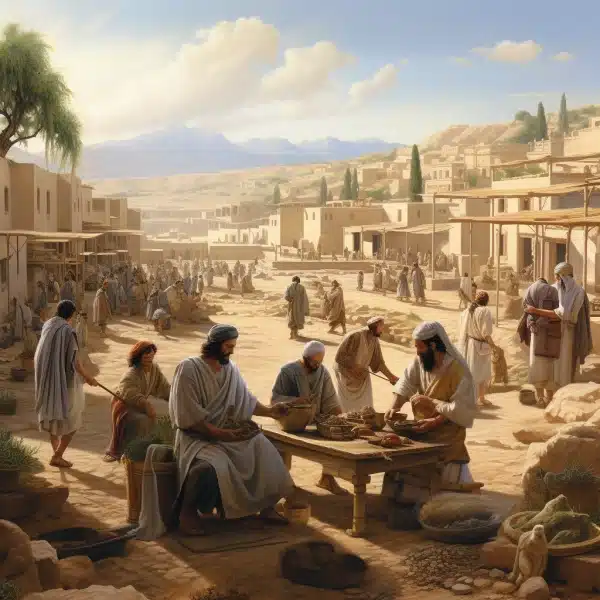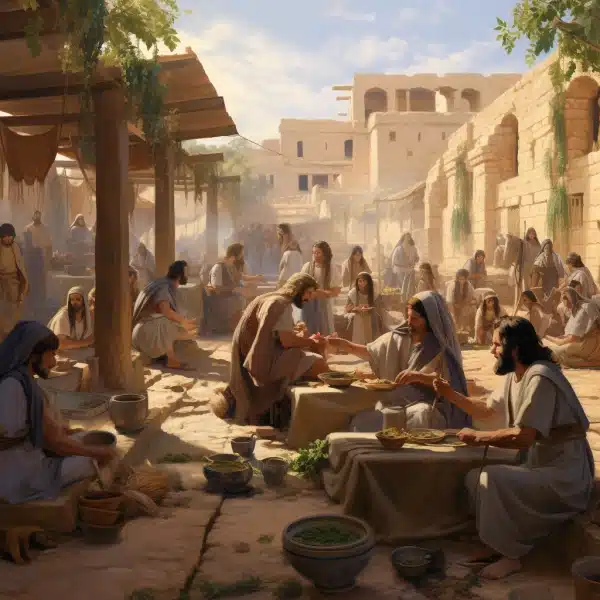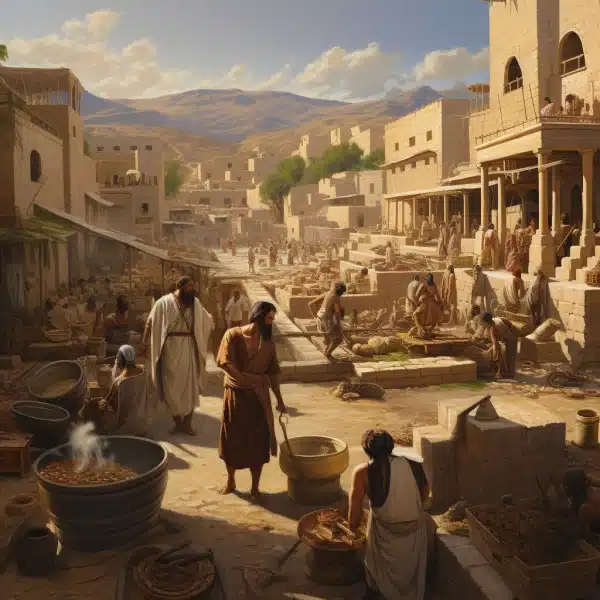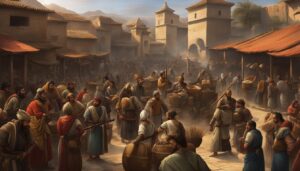
The study of daily life in Biblical times is a fascinating glimpse into the culture and traditions of an ancient era. In this section, we will explore various aspects of daily life, including customs, traditions, and the general lifestyle during the Biblical period. Through the information gathered from several sources, we will gain a deeper understanding of what it was like to live in ancient Judea and how their way of life shapes our understanding of the Bible.
Key Takeaways:
- Daily life in Biblical times offers valuable insights into the historical and cultural context of the Bible.
- Understanding Biblical era customs and traditions helps us comprehend the stories and teachings within the Bible.
- The study of ancient lifestyles in the Bible deepens our understanding of the ancient world and its impact on the Bible.

Cultural Practices and Traditions in Biblical Times
In ancient Judea, cultural practices and customs shaped how people lived and interacted with each other every day. Understanding these customs provides valuable insights into the daily lives of individuals during the Biblical period and sheds light on the historical context of the Bible. Let’s explore some key aspects of Biblical culture and traditions.
Social Structure
The social structure in Biblical times was hierarchical, with distinct roles and responsibilities for different members of society. At the top of the social hierarchy were religious leaders and ruling authorities, followed by wealthy landowners and merchants. Below them were farmers, craftsmen, and laborers, while at the bottom were slaves and servants. This social structure influenced relationships, power dynamics, and opportunities available to individuals.
Family Dynamics
The family was the foundation of society in Ancient Judea, and it played a central role in the lives of individuals. Families were typically patriarchal, with the father serving as the head of the household. Marriage was an important institution, often arranged by parents, and it served as a means to establish alliances, secure inheritance, and ensure the continuity of the family line.
Religious Practices
Religion played a significant role in the daily lives of people in Biblical times. Ancient Judea was primarily a monotheistic society, with the worship of the God of Israel at the center of religious life.
| Cultural Practices | Examples |
|---|---|
| Food and Dietary Laws |
|
| Festivals and Celebrations |
|
| Prayer and Worship |
|
“Religion played a significant role in the daily lives of people in Biblical times.”
By examining these cultural practices and traditions, we can gain a deeper understanding of daily life in Biblical times and how it influenced the thoughts, actions, and interactions of individuals. The rich tapestry of cultural practices in ancient Judea continues to shape our understanding of the Bible and provides valuable insights into the historical and social context of the time.
Daily Routines and Lifestyles in the Bible
Studying how people lived in Biblical times helps us learn about their lifestyle. This gives us insights into their way of life and helps us understand the Bible better. We can learn about their daily routines, work, and how they interacted with each other.
One significant aspect of daily life in ancient times was the emphasis on agriculture. Agricultural activities were accompanied by the raising of livestock, including sheep, goats, and cattle. These activities required meticulous planning, hard work, and a deep understanding of nature’s rhythms and cycles.
The division of labor within ancient communities was well-defined. Men primarily worked in the fields and engaged in trade and commerce, while women were responsible for household tasks, such as cooking, spinning, weaving, and taking care of children.
Roles and Responsibilities
“A woman’s role in Biblical times was primarily centered around the home. She was responsible for ensuring the family was well-nourished, clothing was made, and the household was properly managed,” explains Dr. Rachel Levine, an expert on ancient civilizations.
“Men, on the other hand, were responsible for providing for the family’s physical and financial needs. They were often involved in trade and commerce, and some held positions of authority within their communities,” Dr. Levine adds.
Leisure time was also an important part of daily life. People gathered for social activities, including celebrations, religious festivals, and communal meals. These gatherings fostered a sense of community and provided opportunities for storytelling, music, and dance.
| Men’s Roles | Women’s Roles | Children’s Roles |
|---|---|---|
| Engaged in farming and trade | Managed household tasks | Assisted parents and learned necessary skills |
| Involved in community affairs | Cooking, spinning, and weaving | Education and religious observance |
| Held positions of authority | Child-rearing and nurturing | Family and community responsibilities |
Studying how people lived in Biblical times helps us understand their customs and traditions. This helps us appreciate how their lives were connected. We can also understand the historical and cultural context of the Bible better. This helps us interpret and apply its teachings more deeply.

Conclusion
Learning about the daily life in Biblical times helps us understand the context of the Bible. We can gain deeper insights into its stories and teachings by understanding the customs and traditions of that era. People in ancient Judea had a different way of life, and studying it can help us understand the significance of various narratives and teachings.
By learning about the activities, roles, and responsibilities of people in the Bible, we can understand their everyday lives. This knowledge helps us see the challenges, joys, and values they held dear. Understanding daily life in Biblical times helps us connect the past and present and gain a richer understanding of the Bible’s impact on history and culture.
By studying how people used to live, we can better understand the eternal principles found in religious texts.
FAQ
What is the significance of studying daily life in Biblical times?
Studying daily life in Biblical times provides us with a deeper understanding of the culture and traditions of an ancient era. It helps us comprehend the historical and cultural context of the Bible, shaping our interpretation of its stories and teachings.
What aspects of daily life will be explored in this section?
This section will explore various aspects of daily life, including customs, traditions, the social structure, family dynamics, religious practices, societal norms, and daily routines during the Biblical period.
How can understanding cultural practices and traditions in Biblical times enhance our understanding of that era?
By understanding cultural practices and traditions, we can gain insights into the mindset and way of life of people during that era. It helps us comprehend how their daily lives were influenced by their beliefs, social dynamics, and customs.
What will be covered in the section on daily routines and lifestyles in the Bible?
The section on daily routines and lifestyles will delve into various aspects, including work, agriculture, food preparation, leisure activities, and the roles and responsibilities of different individuals within the community, such as men, women, and children.
How does studying daily life in Biblical times impact our understanding of the Bible?
Daily life in Biblical times was shaped by a unique set of circumstances and customs, and studying it helps us deepen our understanding of the ancient world and its impact on the Bible. It provides valuable insights into the historical and cultural context of the Bible, enriching our interpretation of its teachings.








